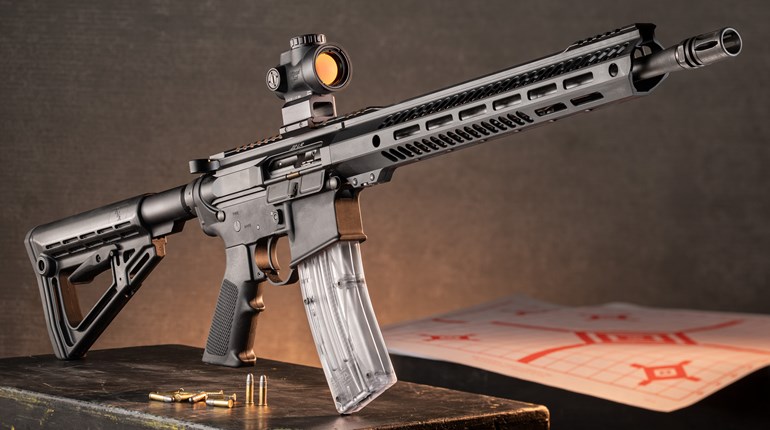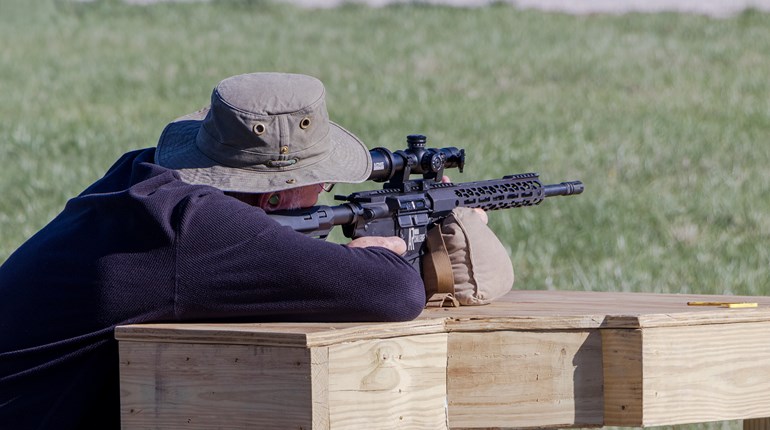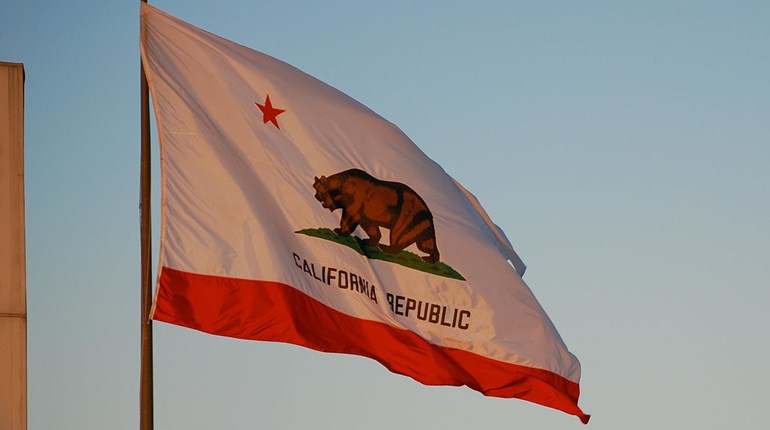
This feature appears in the July ’16 issue of NRA America’s 1st Freedom, one of the official journals of the National Rifle Association.
Even the media have called her out for it. So why does Hillary Clinton continue to lie about the Protection of Lawful Commerce in Arms Act?
Hillary Clinton wants to give big-city politicians and the anti-gun lobby everything they need to sue—or terrorize—America’s firearm industry out of business by making companies liable for crimes committed by criminals who misuse firearms.
Clinton’s campaign website proudly proclaims, “Hillary will lead the charge to repeal the Protection of Lawful Commerce in Arms Act,” or the PLCAA —a law passed by Congress to stop the tidal wave of politically motivated lawsuits that threatened to drive American gun makers, wholesalers and retailers to bankruptcy, even if they didn’t lose a single case in court.
In a March 27 op-ed in the tabloid New York Daily News, Clinton wrote, “First, we need to repeal the law that gives the gun industry sweeping liability protections, so companies that make and sell guns can be held accountable when their products kill people.” Then she goes on to push a laundry list of her other anti-gun proposals.
But as usual, Hillary Clinton lies about the entire issue.Clinton’s claim that the firearm industry is “wholly protected from any kind of liability” is also a lie.
And at every opportunity on the campaign trail, Clinton brings up the issue to try to draw a distinction between herself and rival Democrat Bernie Sanders, who voted for the PLCAA (before saying that he believes the families of crime victims should be allowed to sue gun makers).
Hillary Clinton Builds Her Platform On Anti-Gun Lies
On her campaign website, Hillary Clinton claims that the PLCAA is “a dangerous law that prevents victims of gun violence from holding negligent manufacturers and dealers accountable for violence perpetrated with their guns.”
And in campaign appearances, Clinton claims the firearm industry is “the only industry in America, the only one, that has this kind of special protection.”
To put it politely, Clinton’s claims are baldfaced lies.
First of all, the law doesn’t protect “negligent manufacturers and dealers.” And Clinton’s claim that the firearm industry is “wholly protected from any kind of liability” is also a lie.
A dealer who sells a gun to someone he or she knows is a prohibited person—or even that he or she reasonably should know intends to use it in a crime of violence—is not only still negligent, and thus not protected from lawsuits, but is also still subject to felony prosecution under federal law.
What’s more, the law doesn’t shield manufacturers from lawsuits arising from defective products that they make or sell. If a firearm is unsafe by design or defective in manufacture, and anyone is injured as a result, the gun maker still can be sued, still can be found liable and still can be legally bound to pay any damages awarded by any court.
The PLCAA didn’t change anything in such situations.
Furthermore, the firearm industry isn’t “the only business in America” that’s protected by federal law from certain liability lawsuits, as Clinton falsely and repeatedly claims.
Indeed, the Communications Decency Act protects telecom companies from liability. The National Childhood Vaccine Injury Act protects pharmaceutical companies from liability. A 1994 law protects the manufacturers of small aircraft from liability. And a 1976 law protects the manufacturers of medical devices
from liability.
Which means Clinton’s latest claims about the PLCAA law are just more in a long line of Clinton fabrications.
If a firearm is unsafe by design or defective in manufacture, and anyone is injured as a result, the gun maker still can be sued, still can be found liable and still can be legally bound to pay any damages awarded by any court.Even the political “fact checker” Politifact.com—whose bias in favor of Democrats has been widely noted—had no choice but to rate Clinton’s claims flat-out “False.” In case you don’t have a Politifact-to-reality translator, that equates to, “Liar, liar, pantsuit on fire.”
How A 2005 Law Saved America’s “Arsenal Of Democracy”
If you’re not familiar with the law, the PLCAA simply states that if a firearm isn’t defective, and if the manufacturer, wholesaler and retailer broke no law in making or selling it, then they cannot be held financially responsible for crimes that they had no part in and had no reasonable way to anticipate.
Makes sense, right? It’s no different from saying that automakers and car dealerships shouldn’t be liable for criminals who drive drunk or use cars to commit crimes. In fact, the traditional rule governing third-party liability is that a company is not responsible for the criminal misuse of its products by a third party (unless, in some cases, it has a “special relationship” to the perpetrator or the victim). So the PLCAA isn’t about giving the gun industry special protection other businesses don’t have. It’s about ensuring activist judges do not create an especially unfavorable rule that would apply specifically to that industry.
So it’s no surprise that in a poll of 1,000 registered voters conducted in April by Harper Polling, 70 percent of Americans do not support allowing crime victims to sue firearm manufacturers and retailers when firearms they made or sold lawfully after background checks are used illegally in crime. If the product is legal, and no one broke any law or even did anything irresponsible, why should they be held responsible for the criminal actions of third parties? Obviously, they shouldn’t—and this goes to the root of Western jurisprudence.
You wouldn’t think you’d need a federal law to mandate such common sense and justice.
And you wouldn’t expect politicians on Capitol Hill—many of whom are lawyers who should understand such concepts—to block it. But block it they did, for 10 long years, led by the former Senate majority leader, Democrat Tom Daschle.
In the meantime, multiple American gun makers were financially devastated.
It’s not hard to see how: Even if plaintiffs didn’t win a single case in court, the attorneys’ fees and other costs of mounting multiple legal defenses in multiple states—remember, there were dozens of such lawsuits filed—were enough to bring the industrial and economic engine of Second Amendment freedom to a screeching halt.
And that was their strategy from the start. As former Housing and Urban Development Secretary (and current New York governor) Andrew Cuomo put it, gun manufacturers who refused the Clinton administration’s demands would suffer “death by a thousand cuts.” “If you don’t sign,” New York’s disgraced former attorney general Eliot Spitzer threatened Glock, “your bankruptcy lawyers will be knocking at your door.”
How Justice Can Be Overruled When Juries Become Judges
In other words, these anti-gun politicians were trying to achieve through lawsuits what they couldn’t achieve through legislation. This is an important distinction. Because while legislation depends on the votes of elected leaders—who are accountable to the American people in every election—lawsuits depend on how convincing plaintiffs’ attorneys can be, and how effectively they can pull the heartstrings of juries with the heartbreaking injustice of criminal victimization. The political leanings of unelected judges can’t be discounted, either.
Put yourself in the shoes of a jury member. The plaintiff’s loss is undisputed. The plaintiff is there in court with you, looking you in the eye through tears. It’s often easy to sway a jury through emotion when someone has suffered a loss. It’s sometimes not so easy to get juries to abide by reason and—despite sympathizing with the plaintiff—deny them an award because the industry did nothing wrong. And it’s doubly difficult when you have false-hearted politicians like Clinton taking the blame off of criminals and putting it on the shoulders of nameless, faceless, supposedly deep-pocketed corporate “merchants of death.”They want to intimidate the firearm industry—for fear of potentially bankrupting lawsuits—to stop selling firearms like the AR-15, which despite being the most popular-selling rifle in America today, is used in less than 2 percent of all homicides.
For these reasons, when faced with dozens of lawsuits, members of the firearm industry were forced to either settle out of court to try to minimize their losses, or risk far higher losses by going all the way to trial. And even if they won in court, the costs incurred from such a legal assault—from attorneys’ fees and depositions to court costs and everything else—were enough to drive the firearm industry, which is, for example, about one-sixteenth the size of the soft drink industry, out of business forever.
The only thing that stopped this assault was the 2005 PLCAA, making it among the most important federal pro-gun reforms of the past 30 years.
And now Clinton vows to make repealing that law one of her top priorities.
Election 2016 Decides The Verdict For U.S. Firearms Commerce
If Clinton wins the White House and succeeds in repealing the PLCAA, America’s firearm industry could be terrorized into discontinuing firearms that the political elites demonize—semi-automatic rifles like the AR-15 today, handguns or who-knows-what-else tomorrow. Simple economics might not give them a choice.
What’s more, legislation to repeal the PLCAA already has been introduced in both houses of Congress—S. 2469, introduced by U.S. Sen. Richard Blumenthal, D-Conn., and the so-called “Equal Access to Justice for Victims of Gun Violence Act” (H.R. 4399), introduced by Rep. Adam Schiff, D-Calif.
Other developments are equally chilling. In a Connecticut courtroom just this last April, Judge Barbara Bellis ruled that the PLCAA does not require dismissal of a lawsuit by the survivors of Sandy Hook victims against Remington Arms Co. for selling the rifle that was used in that unspeakable crime—a rifle that was lawfully manufactured, lawfully wholesaled and lawfully sold to a non-prohibited purchaser, but stolen from the purchaser by her son, who also murdered her.
How could Remington possibly have foreseen such a thing? Obviously, they couldn’t.
But the plaintiffs’ lawyers say that doesn’t matter. Regardless of the PLCAA, and regardless of the fact that selling AR-15s in Connecticut was perfectly legal at the time, they say the rifle was too dangerous to ever be sold to the public, and that for doing so, Remington is supposedly liable for the crimes committed at Sandy Hook.
It’s absurd.
And it’s not hard to see what they have in mind: They want to intimidate the firearm industry—for fear of potentially bankrupting lawsuits—to stop selling firearms like the AR-15, which despite being the most popular-selling rifle in America today, is used in less than 2 percent of all homicides.
If they’re successful, what’s to stop them from using the same absurd legal theory to terrorize the gun industry to stop making handguns or, for that matter, to stop producing firearms at all? How is any manufacturer or dealer, after all, supposed to know which otherwise legal firearms a judge or jury will at some point determine are simply too dangerous to entrust the public with, especially when gun control advocates make that argument against essentially all firearms?
If anything should be clear by now, it’s that this is exactly the outcome that Clinton envisions. Never mind the nearly 300,000 Americans whose jobs depend on the firearm industry. Never mind our armed forces, whose readiness and safety depend on the products of America’s “arsenal of democracy.” And never mind the untold numbers of Americans every year who use a firearm to stop or deter a criminal attack. Clinton would sacrifice them all to wage her hypocritical war on your Second Amendment-protected right to keep and bear arms.
If you want to keep that freedom, you need to get registered to vote now. And on Election Day this year, you need to stand and fight, with the NRA, to defeat Hillary Clinton and defend the industry that makes the tools that give you the ability to survive.


































